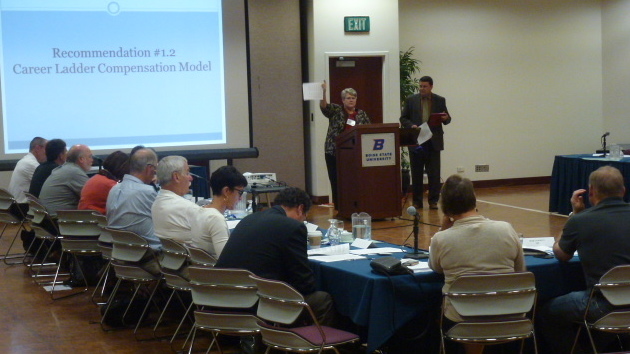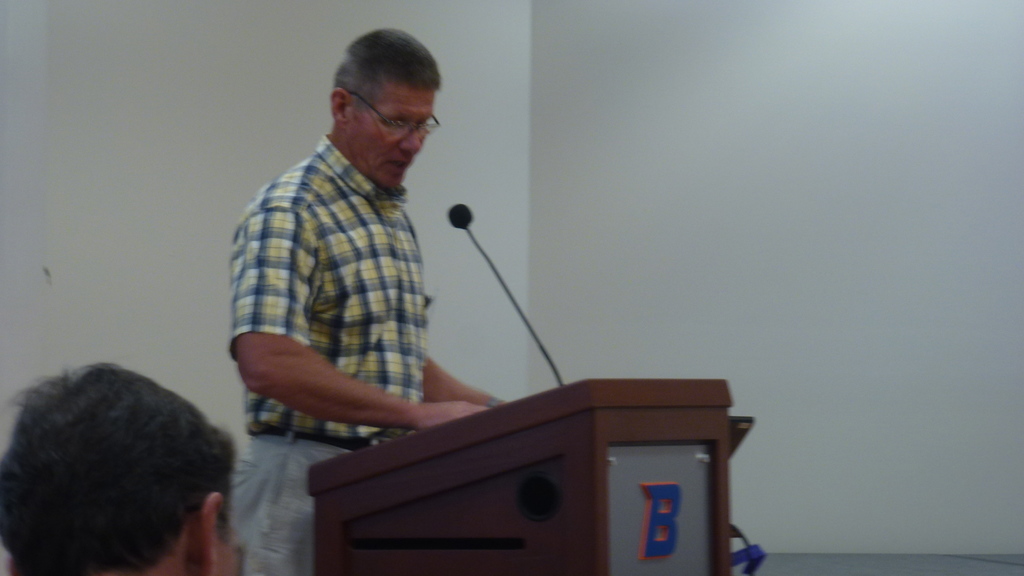2:07 p.m.: Task force adjourns with a few closing remarks from Roger Brown, a staffer for Gov. Butch Otter. He praises the “stunning” expertise of the committee and says the process has been “tremendous to watch.” He says the governor will now look at the recommendations — and the changes in laws and rules they would require, as well as the costs. He says the governor will want to meet to “connect the dots” between what the task force has proposed, and what can be implemented.
2:03 p.m.: The committee moves quickly through the rest of the recommendations, approving eight of them on unanimous votes, with little or no debate. Among the highlights: a shift to enrollment-based school funding, which could carry a $60 million price tag, tiered teacher licensure, and teacher mentoring programs.
1:57 p.m.: After a detailed walkthrough on the details, the task force votes unanimously — again — on perhaps the most costly proposal on the table: a teacher career ladder plan.
This plan would increase minimum teacher salaries from $31,000 to $40,000. Pay for veteran teachers would increase to $50,000 to $60,000, based on performance reviews.
The cost, over six years, was pegged at $253 million.
Senate Education Committee Chairman John Goedde said the idea could raise eyebrows at the Statehouse. “We have a tremendous potential here to bust the bank,” said Goedde, R-Coeur d’Alene.
But Rep. Janie Ward-Engelking, a Boise Democrat and retired teacher, said the career ladder could give college students an incentive to pursue a career in teaching. This would allow good teachers to stay in the classroom, she said, and “keep other states from taking our best and our brightest.”
1:11 p.m.: Jason Hancock, the state Department of Education’s deputy chief of staff, is walking through the career ladder program. Hancock consulted with the task force on the plan.

12:59 p.m.: The task force votes unanimously to support restoring operational funding. Unlike some of the technology recommendations approved this morning, operational funding has a clear price attached. Now comes, perhaps, the biggest line item: a teacher career ladder that could cost $253 million over six years.
12:52 p.m.: The task force is back from lunch, with Meridian district Superintendent Linda Clark getting ready to walk through recommendations. Up first: restoring $82.5 million in school operational funding.
12:09 p.m.: Before breaking for lunch, the task force does some wordsmithing and approves a recommendation on technology.
Here’s the key phrase, as rewritten.
“We recommend that every educator and student have adequate access to technology devices with appropriate content to support equal access and opportunity.”
The rewrite addresses two concerns.
The first, and more straightforward one, is access to educational content.
The second is one of packaging. Some task force members were skittish about wording that called for universal access to “computing devices” — less than 10 months after Idaho voters rejected Proposition 3, a law that would have provided all high school students with laptops.
House Education Committee Chairman Reed DeMordaunt argued that the original wording was not an attempt to replicate Proposition 3. “We are not recommending a one-to-one device situation.” He said that the change to “technology devices” reflected hair-splitting.
The reworded recommendation passed unanimously.
11:47 a.m.: The task force recommends equipping all K-12 schools with high-speed bandwidth and wireless technology. This comes on the heels of the Idaho Education Network, a high school broadband system, and a controversial new state contract to install WiFi in high schools and junior high schools. During the debate, Idaho Education Association President Penni Cyr expressed some concern; saying high-tech spending should not outstrip “all the other things we are recommending today.” The broadband/wireless recommendation received unanimous backing.
11:35 a.m.: Now, the task force turns to collaboration. Without dissent, the group approves a recommendation calling for “job-embedded” professional development and collaboration time, and a second recommendation to create a “statewide electronic collaboration system” allowing teachers to share ideas.
11:31 a.m.: The task force gives unanimous support to the final piece of the accountability plan, a recommendation to require school districts to write annual strategic plans and submit them to the state. There was some discussion about whether the accountability plans could allow the state to swoop in and fire a district superintendent, over the wishes of locally elected trustees. Task Force member Mike Lanza downplayed that possibility. If a school district is continually struggling, he said, “The local board will feel some pressure to come up with a remedy.”
11:10 a.m.: The task force votes unanimously to support two proposals to revamp the accountability process. One calls for pruning state rules that restrict flexibility at the school district level. The other reworks the relationship between the state and local superintendents.
Here’s a walk-through:
1. The state would publish an “annual planning memo” outlining key themes, templates and items of interest.
2. Districts then build their own strategic plan, identifying key focus areas.
3. Districts then produce an annual status report, outlining progress toward strategic plans, as well as struggles and key lessons from the year.
4. And here’s the hammer. “Should districts be underperforming and continually struggling to make forward progress, the local board and State Board should collaborate, and if necessary, make leadership changes.”
10:51 a.m.: With no debate, the task force signs off unanimously on two other recommendations: one recommending students demonstrate mastery of literacy “before moving on to significant content learning,” and one that would ensure all high school students are given access to postsecondary courses.
10:49 a.m.: The task force votes, nearly unanimously, to endorse Idaho Core Standards. The standards have had support from a broad range of stakeholder groups, and Friday’s debate reflected that. Superintendent of Public Instruction Tom Luna, Senate Education Committee Chairman John Goedde, Meridian district Superintendent Linda Clark, and Idaho Education Association President Penni Cyr all spoke in favor of Idaho’s variation of Common Core. Madison district Superintendent Geoffrey Thomas argued against the standards — citing opposition at the task force’s Idaho Falls public hearing in April — and cast the lone dissenting vote.
10:29 a.m.: The first recommendation is in the books. The task force voted unanimously to support a “mastery-based” education system. From the structural change subcommittee’s report: “We recommend the state shift to a system where students advance based upon content mastery, rather than seat time requirements. This may require a structural change to Idaho’s funding formula and/or some financial incentive to school districts.”
10:17 a.m.: The “structural change” subcommittee is starting to walk through its recommendations, for full task force votes. Very small turnout in the audience. Only about a dozen people, and several are state staffers. Idaho Education Association has two representatives in attendance.
10:08 a.m.: Task force is back in session. House Education Committee Chairman Reed DeMordaunt and Bob Lokken are taking the podium to talk about recommendations from the “structural change” subcommittee.
9:53 a.m.: Task force members are starting to trickle back into the meeting room. I suspect we’ll get rolling shortly.
9:26 a.m.: Since we have a break in the action, here are a few handy links for the day.
- Our Thursday story on the task force recommendations.
- The subcommittee recommendations.
- Our Wednesday story; in it, Gov. Butch Otter says cost will be a “limiting factor” in education reform.
- A list of the task force membership.
- Friday’s meeting agenda.
- A link to the live stream.

9:15 a.m.: The task force has just broken into subcommittees, to work on their recommendations. They’re expected to reconvene at 9:45.
9:06 a.m.: Good morning, and welcome to our live blog of the education task force’s meeting. I’ll update this blog throughout the day with news, quotes and some quick analysis. I’ll also live-tweet @idahoednews. If you have comments or questions throughout the day, post them and I will try to respond.
